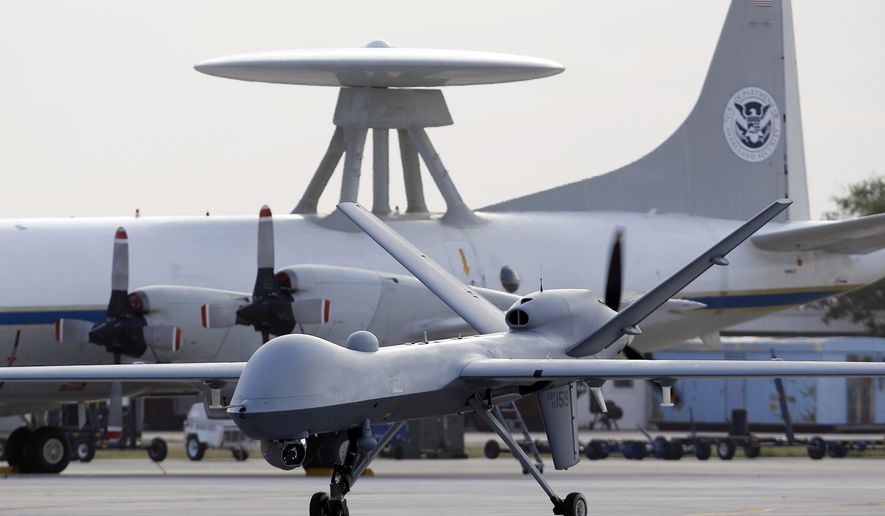In a war first, Syrian allies Russia and Iran have begun unleashing “suicide” drones that land and explode, presenting another challenge to rebels trying to oust the regime of president Bashar Assad.
AP reported on Thursday that a Russian-owned broadcasting company is flying drones over the capital of Damascus, and its video shows the utter destruction of Rebel-held neighborhoods by Syrian government bombardment.
The opposition news agency Syria Mubasher reported that six remotely controlled drones struck near fighters for Ahrar al-Sham, killing and wounding them, near the western city of Ma’ara al-Nuiman.
Ahrar al-Sham is an al Qaeda-linked coalition that has emerged as a counter to the Islamic State terror army and is seen by the West as willing to negotiate a post-Assad regime.
The Middle East Media Research Institute (MEMRI), which monitors Islamic websites and social media, quoted Syria Mubasher as saying the drones may have come from an air base near Lattakia, a port city in western Syria operated by Russian forces. Other sources said the air vehicles were launched from Shiite-controlled areas, meaning it was likely the work of Iran and its surrogate, Lebanese Hezbollah.
The Syrian “Smart News” agency quoted an Ahrar al-Sham commander as saying the drones landed and then exploded like a booby trap.
Iran boasted last year of a growing arsenal of kamikaze drones and has threatened to launch them against U.S. Navy ships in the Persian Gulf. The weapon is a relatively low-cost, low-technology smart weapon since it merely has to be steered into a target, as opposed to releasing precision weapons and returning to base.
The use of drones would provide Mr. Assad with yet another weapon to attack various rebel groups, some of them associated with the U.S. American officials say a large majority of Russian airstrikes are directed at these groups and not at the Islamic State terror army, which the Western-led coalition is trying to defeat.
Western experts believe Russian President Vladimir Putin’s objective is to disrupt or destroy rebel groups backed by the U.S. to solidify Mr. Assad’s hold on power.
Mr. Assad’s forces have used chemical weapons to commit mass killings. More recently, they dropped barrel bombs described as large improvised explosive devices.
“It should be noted that, in late 2014, in the course of a military exercise it conducted, Iran presented ‘suicide’ drones intended to explode against their targets,” the MEMRI report said. “At the time, the Iranian website Mashregh News, which is affiliated with security circles, presented 10 models of drones and said that some of them were suitable for suicide missions while others could be modified for such operations.”
In Moscow, Mr. Putin on Thursday accused the West of playing a “double game” with terrorist groups in Syria, where a U.S.-led coalition is conducting a bombing campaign.
“It’s always difficult to play a double game: declaring a fight against terrorists while simultaneously trying to use some of them to arrange the pieces on the Middle East chess board in one’s own interests,” Mr. Putin told a group of political scientists known as the Valdai Club a day after Mr. Assad visited Russia.
“It is impossible to prevail over terrorism if some of the terrorists are being used as a battering ram to overthrow undesirable regimes.”
With a dateline of Beirut, the AP story on Russian drones flying over the Damascus neighborhood of Jobar said the video was shot by war correspondent Yevgeny Poddubny on Oct. 18 for RTR, Russian’s state-owned broadcasting company.
Jobar’s destruction is repeated in other rebel-held neighborhoods in other Syrian cities, where the Syrian air force readily hits civilian targets.
“Artillery shells and airstrikes on Jobar shake Damascus on a daily basis,” the AP said. “The video shows an elaborate network of long trenches used by rebels in the conflict. It also shows gunmen running from building to building as they try to dodge artillery and aerial bombardment.”
• Rowan Scarborough can be reached at rscarborough@washingtontimes.com.




Please read our comment policy before commenting.